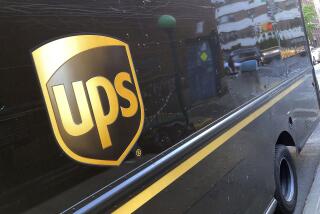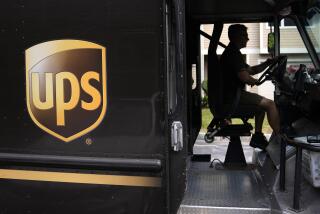UPS Packs a Wallop in Record Stock Market Debut
- Share via
United Parcel Service Inc., the world’s biggest package delivery concern that resisted selling its stock to the public for almost a century, finally offered its shares Tuesday and raised $5.47 billion in the biggest initial public stock offering in U.S. history.
Atlanta-based UPS, known for its fleet of chocolate-brown trucks and uniforms, sold 109.4 million shares for $50 each. There’s widespread anticipation that the stock will jump considerably higher after it starts trading today on the New York Stock Exchange.
That’s because the UPS sale extends another banner year for the stock market in general and for IPOs in particular. The IPO market has been mostly driven by spectacular gains of many young Internet-related firms whose stock prices often have soared to mind-boggling heights, boosted by investors hoping to ride the Internet wave.
But the UPS stock sale also reflects a deep well of investors who are looking to own a piece of a venerable, reliable company with a long history of consistent profit--and one with a solid future because the Internet is now hosting an exploding number of online retailers that, in many cases, deliver their goods via UPS.
UPS and its 330,000 employees--the company is one of the largest employee-owned companies in the nation--deliver 12.5 million packages and documents each business day, or more than 3 billion annually. The company has a fleet of 149,000 trucks and other vehicles, and 536 airplanes.
It’s even possible that a few of the company’s 66,000 drivers and other hourly workers who own UPS stock could become instant millionaires on paper--only two years after they badly disrupted UPS operations with a rare 15-day strike.
But it’s unlikely many of its hourly workers will see such riches, said Bret Caldwell, a spokesman for the workers’ union, the Teamsters. Hourly workers have been able to buy UPS shares only since 1995, and though the union doesn’t have exact figures, “we don’t believe that thousands of employees have been able to make significant enough purchases of the stock to become millionaires” via the IPO, he said.
Even so, “we certainly are hoping . . . the IPO is good to them,” he added.
“I’m pretty excited, but I wished I owned more [stock],” said Clarence Witchard, a UPS driver from the Atlanta suburb of College Park who started buying shares two years ago.
Public investors are excited too. Amid the flurry of highflying IPOs by fledgling Internet firms with short loss-ridden histories, the UPS offering stands out as a rare opportunity for investors to buy into an established blue-chip leader of its industry, with revenue last year of $24.8 billion and earnings of $1.7 billion.
The prior record for an IPO occurred a year ago when oil company Conoco Inc. raised $4.4 billion. And only two days ago, cable-TV operator Charter Communications Inc. became the fourth-largest IPO by raising $3.23 billion, according to research firm Thomson Financial Securities Data.
The UPS shares--which will trade under the UPS ticker symbol--represent about 10% of the company’s total ownership. The rest of UPS’ stock will continue to be owned by about 125,000 of its managers, supervisors, hourly workers, retirees, foundations and descendants of the company’s early leaders.
Analysts nonetheless don’t expect UPS stock to skyrocket like many of the new Internet shares. But the fact that UPS had twice revised upward the expected price of its IPO--and the $50-a-share price still exceeded that prior estimate--”is a good indication there’s going to be some upside” in the stock’s price today, predicted Steven Lacey, managing editor of IPO Reporter, a trade publication in New York.
Another reason for the heightened demand for UPS stock is that many institutional investors, such as mutual funds that specialize in large companies, are limited to buying IPOs of companies “with a track record of at least 10 years of operation,” Lacey noted.
As with most IPOs, UPS technically sold its stock Tuesday to the investment firms that underwrote and set the per-share price of the sale--in this case, a group led by Morgan Stanley, Dean Witter & Co. The underwriters will sell the stock today to their clients, and the shares will begin freely trading on the market, available to any investor.
UPS sold a Class B version of its stock to the public that has one vote per share; its existing employee-retiree stockholders continue to own Class A stock that carries 10 votes per share, thus ensuring those investors’ continued control of the company.
The company also plans to use the IPO’s proceeds to buy back about 10% of its stock from its current stockholders. After that, any current holders are free, within normal IPO regulations, to eventually sell their stock on the open market. But of course they risk that the price could fall by then.
The stock sale instantly made UPS one of the nation’s largest publicly traded companies in the world, and assigned it a total stock market value of $60.2 billion. By contrast, rival Federal Express’ parent company, FDX Corp., has a market value of $13.1 billion, and Airborne Freight Corp.’s is $11.6 billion.
But going public also represents an enormous change for UPS, which first announced plans for the sale in July. For decades, UPS resisted the idea of public ownership in part because it means having to open its books, deal with Wall Street securities analysts and defend the ups and downs of its stock price in the media.
And it’s not that UPS is short of cash; it has more than $3 billion in cash reserves. Rather, UPS wants to have a publicly traded stock to use as an alternative currency for acquiring other companies.
UPS hasn’t identified potential targets. But the entire transportation industry, including the package delivery business, is rapidly changing and becoming ever more global in size to accommodate multinational corporations.
For that reason, UPS has said it might want to use its stock to buy other companies “in markets around the world,” particularly those involved in transportation logistics, which are firms that take complete control of storing, moving and managing a customer’s inventories and supplies.
To be sure, UPS stock carries risks like any other investment. Fluctuations in fuel prices can hurt the company. The burgeoning transportation logistics business is chock-full of rivals, including FedEx and Ryder System Inc., among others. Overseas, UPS is facing stiffened competition from foreign postal services, which is one reason UPS is thinking about making international acquisitions.
To herald the IPO, UPS has received permission to close Wall Street today, where it will drape the New York Stock Exchange with a UPS banner and park a Boeing 727 fuselage on the street, along with a small fleet of its vehicles.
*
Associated Press was used in compiling this report.
*
CABLE GIANT
Charter Communications shares surged 20%, after raising $3.23 billion in its IPO. C6
BIGGEST DEALS
A roundup of the 10 largest initial public offerings in the United States. C4
More to Read
Inside the business of entertainment
The Wide Shot brings you news, analysis and insights on everything from streaming wars to production — and what it all means for the future.
You may occasionally receive promotional content from the Los Angeles Times.











